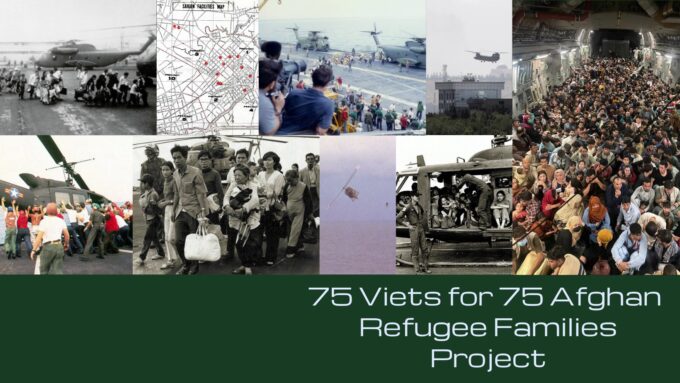
Our group has received immense interest from the media about why we formed Viets4Afghans. Since launching our efforts on about Aug. 20, we have shared our story with Nguoi Viet Tay Bac, VOA Tieng Viet, Nguoi Viet, KOMO-TV, The Seattle Times, KUOW, Wall Street Journal, PBS NewsHour, etc. More coverage is expected in the coming days and weeks. More than 80 Vietnamese families have indicated INTEREST in learning more about the process of hosting refugees, and even more have expressed a desire to help in other ways, including through donations. Thank you to the community for your generosity. Please keep helping, and get involved.
We are learning as we go, and staying nimble as the situation changes. It’s important that we not impose our own views on how to help Afghan refugees. Our team is in the midst of building relationships and connecting directly with the resettlement agencies and Afghan community in Washington to understand unmet needs. Please be patient with us as we try to make sense of all the information that is spreading right now.
As we move forward, here are three principles that are guiding our work:
- Raise awareness of the issues and our place in helping Afghan refugees.
- Mobilize the community to action, especially among Vietnamese Americans.
- Gather and share information regarding people who want to help and the resources available.
We feel a responsibility to leverage all that we have learned from our experiences as a refugee community to help a new generation of people dealing with similar circumstances. Like our Afghan allies, many of those Vietnamese who served alongside the United States during the Vietnam War suffered greatly after that conflict ended in 1975. For many years, people escaped the country by any means necessary. We should be prepared for a similar crisis to happen now that U.S. forces have left Afghanistan. Those left behind will likely continue to look for pathways out of the country, just as Vietnamese people once did.
To follow our local efforts, please visit the following:
- Website: Viets4Afghans.org
- Email suggestions, ideas and feedback to: Viets4Afghans@gmail.com
- Action Guide for Viets in Washington and across the U.S.: bit.ly/Viets4AfghansTakeAction
- We are also on Facebook, Instagram, and Twitter. Look for the ‘Viets4Afghans’ handle.
While we are focused on the situation here in Washington state, it’s important to also understand what’s happening at the federal level. Dr. Nguyen Dinh Thang, executive director of Boat People SOS, sent us the following dispatch. We are re-publishing here, with his permission:
For the past several months, I have been working from the policy advocacy end, capitalizing on our prior experience as refugees resettled to the US in the aftermath of the Vietnam War.
Refugee Council USA (RCUSA), of which I am a Board member, has issued our position statement.
Primarily, we call on the President to raise the 2022 resettlement cap to at least 200K to accommodate Afghan refugees without affecting other refugees. Currently there are some 4,570 recognized refugees in Thailand, including 794 Vietnamese, in Thailand. They have been waiting for years to be resettled. BPSOS has since 2008 provided legal aid to Vietnamese and other asylum seekers through our Center for Asylum Protection in Bangkok. Some 800 Vietnamese refugees were resettled between 2008-2018. However, that number dipped to a negligible trickle in the last two years of the Trump Administration. Last week, the US started interviewing Vietnamese and other refugees in Thailand again. That’s a good sign and we want to keep it that way.
Another important point that we need to worry about is the capacity of resettlement agencies. Regardless of the resettlement cap, the number of refugees being resettled will be capped by the capacity of resettlement agencies. Under the Trump Administration, due to very low resettlement numbers, resettlement agencies have closed offices and laid off staff. Without additional resources to help them rapidly ramp up their capacity, we will see a lot of refugees languishing in the resettlement pipeline while resettlement slots are unused (and forever lost).
So far, 66 members of the House of Representatives have endorsed the 200K cap. They have written a letter to President Joe Biden.
Finally, a bipartisan bill, the WELCOME Act, was introduced in the House of Representatives to allow Afghan parolees to receive refugee-like benefits. Currently, parolees, considered non-immigrants, would not have access to any federal benefit.
I hope that you and friends would talk to your members of Congress in support of the above initiatives. From the vantage point of former refugees from Vietnam who are extending their helping hands to Afghan refugees, our voices would be well noticed by the public and politicians.
Nguyen Dinh Thang, PhD
CEO & President
BPSOS

